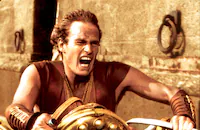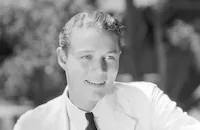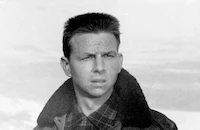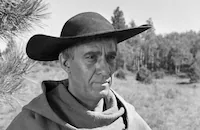Secret of the Incas
Brief Synopsis
Cast & Crew
Jerry Hopper
Charlton Heston
Robert Young
Nicole Maurey
Thomas Mitchell
Glenda Farrell
Film Details
Technical Specs

Synopsis
After securing some business at the Cuzco, Peru, airport, tough American tour guide Harry Steele is summoned to a cantina by old acquaintance Ed Morgan. Down-and-out Ed tells Harry about a job involving an escaped Romanian woman, who is on her way to Cuzco from La Paz, then questions him about a stone Incan treasure map, the missing piece of which Ed knows was found recently by a local Indian. Harry claims ignorance of the map, which legend says leads to a solid gold, jewel-encrusted relic in the shape of a sunburst, and leaves, but is soon shot at by a sniper sent by Ed. The sniper misses, however, and Harry storms back to the bar to confront Ed. Ed, who has been seeking his fortune in Peru for thirty years, freely admits he hired the sniper to frighten Harry and criticizes him for lying about the map and excluding him from the treasure hunt. After dismissing Ed's complaints, Harry leads a group of tourists to the local museum. There, he slips away from the group and fits a piece of broken, inscribed stone into a small replica of Machu Picchu, an Incan temple, which is on display in one of the rooms. Harry quickly studies the replica before returning to the group and noticing an attractive young woman with a suitcase, trying to blend in. Later, at the tourist hotel, Harry meets the woman, Elena Antonescu, who turns out to be the fugitive from Romania. Elena reveals that she was forced out of Bolivia, without papers, and begs Harry for help getting to the United States. Aware that Elena has only fifty dollars to her name, Harry coldly declines until she admits that the Romanian consul, Anton Marcu, who followed her to La Paz, has his own airplane. After telephoning Marcu in La Paz and telling him about Elena's whereabouts, Harry makes a deal with Elena that he will help her get to Ecuador if she helps him steal Marcu's plane. The next day, Harry meets Marcu at the airport and takes him to Elena in the hotel bar. Harry plies Marcu with alcohol and then slugs him, assuring he will be unconscious long enough for Elena to steal the keys to his airplane. Before they leave for the airport, Ed demands that Harry take him along, but Harry refuses. Under cover of darkness, Harry and Elena slip by airport security and steal Marcu's plane, taking off while being shot at by police. Hours later, Harry lands the plane near a river in the Andes Mountains and finally tells Elena their destination¿Machu Picchu. Unhappy but trapped, Elena hikes with Harry to the ruins, where an archaeological dig, led by American Dr. Stanley Moorehead, is being conducted. Harry and Elena tell Stanley and Pachacutec, the leader of the local Indian tribe, that Harry is Elena's pilot and that their plane ran out of gas a few miles away. Although Pachacutec and his sister Kori-Tica are suspicious of Harry and Elena, Stanley is gracious and bandages a small cut that Elena sustained in a fall. As Stanley's crew works to uncover the tomb of an Incan king, Harry finally tells Elena about the sunburst, revealing his belief that the treasure is in the tomb. After Harry confesses he disabled the crew's radio and intends to steal the sunburst, Elena expresses her disapproval but admits she is not in a position to stop him. That night, while the Indians perform sacred rituals in anticipation of the tomb's opening, Stanley and Elena talk under the stars and share a kiss. The next day, Ed appears at the ruins, claiming he came in response to a distress call Harry made before abandoning the plane. Although annoyed by Ed's presence, Harry goes along with his story. Later, after telling Elena that, if she wanted, she could get the gentlemanly Stanley to marry her, Harry comments that she is more his type than Stanley's and kisses her. At first, Elena responds to Harry's passion, but when he nonchalantly instructs her to lead Stanley on until they are ready to leave, she storms off, disgusted. The night before the tomb's unearthing, Stanley proposes to Elena, but she is noncommittal. While Harry and Ed hang back, Stanley leads the way into the tomb, where a carved stone version of the sunburst is found. After Stanley tells Pachacutec that the gold sunburst does not exist, Pachacutec sadly informs his people that the legend, which says that the Incas will be resurrected with the finding of the gold sunburst, is false. Harry declares he is leaving the next day and asks Elena to join him, but just before dawn, he sneaks back to the tomb and, guided by the map piece, discovers the gold sunburst hidden in a wall. Unknown to Harry, Ed has followed him into the tomb and, at gunpoint, demands the sunburst. Before Harry can react, Pachacutec bursts in. Ed shoots at him, then snatches the sunburst from Harry and runs from the ruins, firing wildly at the pursuing Indians. Harry, however, catches up to Ed on a cliff and fights the exhausted older man for the sunburst. Harry grabs the sunburst just as Ed stumbles and falls to his death. For a moment, Harry revels in his victory, then walks back to the ruins and presents Pachacutec with the sunburst. Admitting that finding the sunburst was more important to him than owning it, Harry proposes to Elena, who happily accepts.

Director

Jerry Hopper
Cast

Charlton Heston

Robert Young
Nicole Maurey

Thomas Mitchell

Glenda Farrell

Michael Pate
Leon Askin

William Henry
Kurt Katch
Edward Colmans
Yma Sumac

Alvy Moore
Grandon Rhodes
Robert Tafur

Martin Garralaga
Marion Ross
Geraldine Hall
Harry Stanton
Booth Colman
Rosa Rey
John Marshall
Dimas Sotello
Anthony Numkena
Crew
Bill Andrews
Sydney Boehm
Sydney Boehm
Roy Burns
Eugene Busch
David Buttolph
Sam Comer
John Cope
Farciot Edouart
Mel Epstein
John P. Fulton
Dr. Albert A. Giesecke
Edith Head
Howard Joslin
Russ King
Tambi Larsen
Lionel Lindon
Ranald Macdougall
Daniel Mccauley
Frank R. Mckelvy
Harry Mills
César Miró
Richard Mueller
Hal Pereira
Irmin Roberts
Moises Vivanco
Eda Warren
Wally Westmore
Dorothy Yutzi

Film Details
Technical Specs

Articles
Leon Askin (1907-2005)
Born in Vienna, Austria as Leo Aschkenasy on September 18, 1907, Askin developed a taste for theater through his mother's love of cabaret, and as a youngster, often accompanied his mother to weekend productions.
He made a go of acting as a profession in 1925, when he took drama classes from Hans Thimig, a noted Austrian stage actor at the time. The following year, he made his Vienna stage debut in Rolf Lauckner's "Schrei aus der Strasse."
For the next six year (1927-33), he was a popular stage actor in both Vienna and Berlin before he was prevented to work on the stage by Hitler's SA for being a Jew. He left for Paris in 1935 to escape anti-semetic persecution, but returned to Vienna in 1935, to find work (albeit a much lower profile to escape scrutiny), but after a few years, the writing was on the wall, and he escaped to New York City in 1939, just at the outbreak of World War II. His luck in the Big Apple wasn't really happening, and in 1941, he relocated to Washington D.C. and briefly held the position of managing director of the Civic Theatre, a popular city venue of the day. Unfortunately, after the tragic events of Pearl Harbor in December of that year, the United States became involved in the war that had already engulfed Europe for two years, and seeing a possibility to expediate his application for American citizenship, he enlisted in the U.S. Army.
After the war, Leon indeed became a U.S. citizen and changed his name from Leon Aschkenasy to Leon Askin. He returned to New York and found work as a drama teacher, and more importantly, landed his first gig on Broadway, as director and actor in Goethe's Faust in 1947, which starred Askin in the title character opposite the legendary Albert Bassermann who played Mephisto. The production was a huge success. Askin followed this up with another director/actor stint with Shakespeare's Merchant of Venice and co-starred with Jose Ferrer in Ben Hecht's 20th Century. They were all Broadway hits, and Askin had finally achieved the success he had worked so hard to seek and merit.
It wasn't long before Hollywood came calling, and soon Askin, with his rich German accent and massive physical presence, made a very effective villian in a number of Hollywood films: the Hope-Crosby comedy Road to Bali (1952); Richard Burton's first hit film The Robe; and the Danny Kaye vehicle Knock on Wood (1954).
Askin's roles throughout the 50's were pretty much in this "menacing figure" vein, so little did anyone suspect that around the corner, Billy Wilder would be offering him his most memorable screen role - that of the Russian commissar Peripetschikof who gleefully embraces Amercian Capitalism in the scintillating politcal satire, One, Two, Three (1961). Who can forget this wonderfully exchange between Peripetschikof and Coca Cola executive C.R. MacNamara (James Cagney):
Peripetschikof: I have a great idea to make money. I have a storage full of saurkraut and I'll sell it as Christmas tree tinsil!
MacNamara: You're a cinch!
His performance for Wilder was wonderfully comedic and wholly memorable, and after One, Two, Three the film roles for Askin got noticable better, especially in Lulu and The Testament of Dr. Mabuse (both 1962); but he began to find prominent guest shots on hit television shows too: My Favorite Martian and The Outer Limits to name a few; yet his big break came in 1965, when for six seasons he played General Albert Burkhalter, the Nazi general who was forever taking Col. Kilink's ineptitude to task in Hogan's Heroes (1965-71).
Roles dried up for Askin after the run of Hogan's Heroes, save for the occassional guest spot on television: Diff'rent Strokes, Three's Company, Happy Days; and parts in forgettable comedies: Going Ape! (1981), Airplane II: The Sequel (1982). After years of seclusion, Askin relocated to his birthplace of Vienna in 1994, and he began taking parts in numerous stage productions almost to his death. In 2002, he received the highest national award for an Austrian citizen when he was bestowed with the Austrian Cross of Honor, First Class, for Science and Art. He is survived by his third wife of three years, Anita Wicher.
by Michael T. Toole

Leon Askin (1907-2005)
Quotes
Trivia
Notes
The working titles of this film were Legend of the Inca and Legend of the Incas. Opening credits conclude with the following written statement: "In the high Andes of Peru-where much of this picture was filmed-the descendants of the Inca have searched for centuries for the symbol of their past glories-a fabulous golden disc encrusted with jewels-there are others-who search-but only for gold." As noted in news items and publicity materials, the picture was shot largely in Cuzco and Machu Picchu, Peru, and marked the first time that a major Hollywood studio filmed there. Five hundred Indians were used as extras in the film, according to publicity materials.
According to a June 1953 Los Angeles Times item, Wendell Corey and Viveca Lindfors were originally set to star in the picture. Peruvian-born singer Yma Sumac, who was of Indian-Spanish descent, made her screen debut in the film. In a February 1954 San Francisco Chronicle article, writer Sidney Boehm claimed he got the idea for the picture after meeting Sumac at a party. Hollywood Reporter news items add Rankin Mansfield, Miguel Contreras, Delmar Costello, Rodolfo Hoyos, Zachary Yaconelli and Carlos Rivera to the cast, but their appearance in the final film has not been confirmed. On December 14, 1954, Charlton Heston and Nicole Maurey reprised their roles in a Lux Radio Theatre version of the story.

Miscellaneous Notes
Released in United States Spring May 1954
Released in United States Spring May 1954













